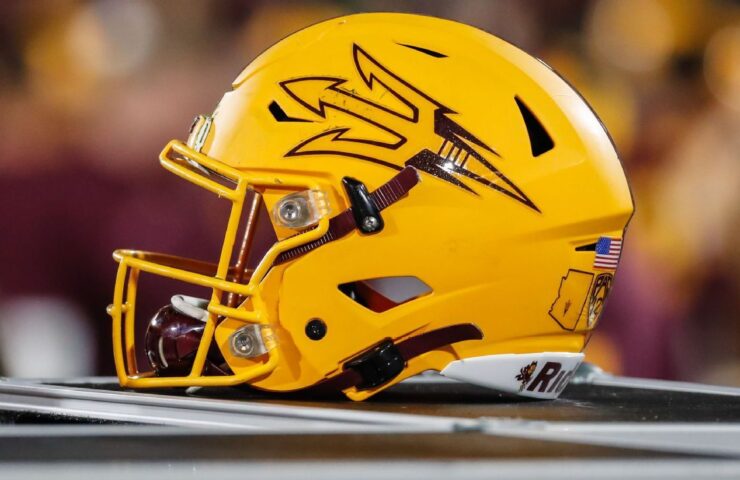
Arizona State self-imposes bowl ban for 2023
-
Pete Thamel, ESPNAug 27, 2023, 10:35 AM ET
Arizona State will not play in a bowl game in 2023 after self-imposing a one-year bowl ban Sunday morning, a decision that acknowledges the severity of the evidence in the ongoing NCAA case against the school’s football program.
Arizona State’s decision comes amid an investigation that began during the tenure of former coach Herm Edwards, whose job with the Sun Devils ended three games into last season after an embarrassing loss to Eastern Michigan. The specter of the NCAA investigation into allegations of repeated and gratuitous recruiting violations has scattered many of the program’s best players.
The heart of the investigation comes from a dossier of documents sent to the NCAA on May 31, 2021, that detailed a trove of recruiting violations, including persistent ignoring of the restrictions implemented during the COVID-19 recruiting dead period. The allegations from the dead period included the mother of a player purchasing tickets for travel to campus, staff members giving tours to up to a dozen recruits in vans when visitors were prohibited, and a position coach working out a prospect in a local park while he was in town and evaluating the video of the illicit workout in an offensive staff meeting.
The fallout from the case has already been significant, as it has led to five full-time coaches leaving the staff or being fired, including defensive coordinator Antonio Pierce, alleged as the ringleader who created a culture in which rule breaking was rewarded. Pierce and former offensive coordinator Zak Hill are among the coaches no longer on staff.
The timing of the bowl ban is a difficult one for the current team, which was informed by school officials at an early-morning meeting Sunday, just days before it opens the season Thursday night against Southern Utah. That game marks the debut of first-year coach Kenny Dillingham.
A source told ESPN that the reaction among the players in the team meeting was “devastating.” Approximately 20 players on the roster are expected to play their final season.
“Their entire goal this year was to right the ship and to make a bowl game,” a source told ESPN of the seniors and veterans.
Dillingham told reporters that he learned of the bowl ban Sunday morning. He called the situation “upsetting” but added that he wanted his players to find motivation from their circumstances.
“It’s my job to try to get our team and rally our team behind each other to go compete and go work at the highest level,” Dillingham said.
More than 50 of Arizona State’s players were recruited by Dillingham and did not get recruited by Edwards or his staff. The bowl ban is expected to eventually result in a one-year contract extension for Dillingham, who had protections built into his initial five-year deal tied to the NCAA investigation.
The decision to self-impose a bowl ban comes at an interesting inflection point for NCAA enforcement. Tennessee faced a similarly daunting volume of allegations in its recent NCAA case, but the Volunteers escaped a postseason ban with a punishment that included an $8 million fine. That decision prompted speculation that bowl bans may be an antiquated tool for punishment in NCAA enforcement, as recent decisions were made under the backdrop of NIL rules that have changed the conventional paradigms of amateurism.
Also, the fairness of punishing those not connected to the alleged violations has emerged as a hot-button issue. Arizona State’s decision to self-impose this punishment hints at the severity of what is expected to be alleged by NCAA enforcement. There is expected to be additional punishment coming for the Sun Devils — whose nine major NCAA violations exceed that of any other major conference school — and the individual coaches who are under investigation.
It is unclear whether Arizona State was offered a similar fine that Tennessee was issued, but it is notable that Arizona State’s athletic department resources are not in the same financial hemisphere as Tennessee’s. A department spokesperson declined to comment when asked specifically whether some type of fine had been an option, citing the ongoing case.
Arizona State athletic director Ray Anderson said in a statement Sunday that the school would not comment further because of the ongoing investigation. The notice of allegations in the case has yet to be delivered, sources said.
Both Edwards and Pierce are not expected to return to college coaching. After leaving Arizona State, Edwards joined ESPN as an analyst in November, returning to a role he held from 2009 until his hiring by the school.
The notice of allegations is expected to be delivered at some point this season. The case is expected to feature an unusual number of former coaches and staff members cooperating, as the original dossier came together as a text chain among Arizona State coaches in shock over the number of rules violations happening in the program. They included specifics rare in NCAA cases, such as a picture of Edwards taking a person alleged to be a top-100 recruit for a tour around the Arizona State weight room during a dead period.
The text chain became the basis of the information that was brought to the NCAA. The dossier included evidence with pictures and documentation of flights for recruits arranged by assistant coaches and the mother of a former player booking trips for recruits and their families.
